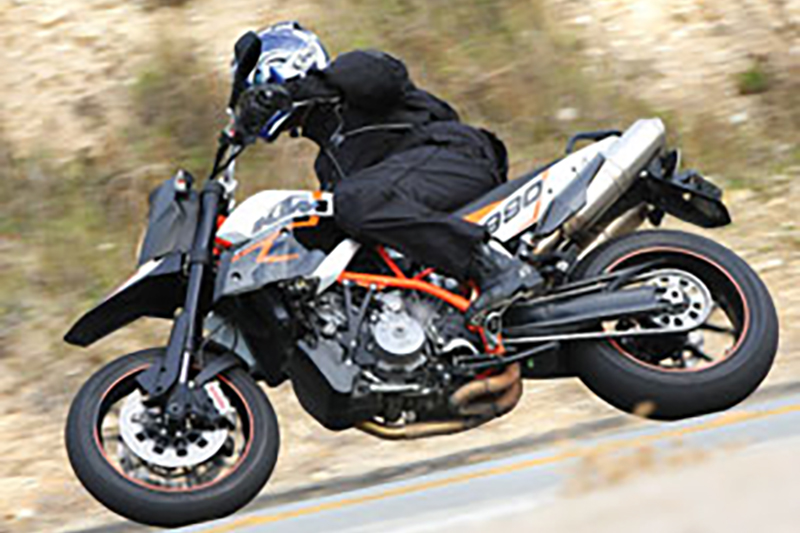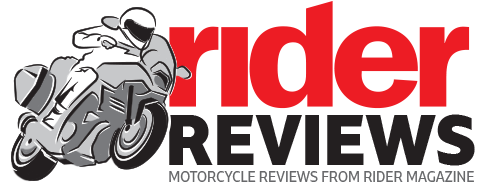2010 KTM Supermoto R

Road Test Review
On a hot, bone-dry day in July 2008, I sat on a sandy hill overlooking Laguna Seca Raceway’s infamous Corkscrew, a blind, downhill chicane that is one of the most challenging turns in road racing. It was my first time at the legendary track. Soon a swarm of KTM RC125 two-strokes came over the hill on the first lap of the Red Bull AMA U.S. Rookies Cup. One of the young ’uns tucked the front and tumbled face-first down the hill as his competitors buzzed toward Rainey Corner. Later, history unfolded when Valentino Rossi made an off-track pass of Casey Stoner in the Corkscrew to take his first-ever U.S. MotoGP win, culminating in Rossi’s eighth world championship.
Returning to this hallowed ground 16 months later, it was with a healthy dose of trepidation that I approached the Corkscrew for the first time on the exotic KTM 1190 RC8 R. I held my breath before, during and after, but I made it, not once but dozens of times.
KTM’s 2010 street-only lineup includes superbikes (1190 RC8 and 1190 RC8 R), streetfighters (990 Super Duke R, 690 Duke and 690 Duke R) and supermotos (990 Supermoto R, 990 Supermoto T and 690 SMC). Having sampled the KTM 690 Enduro R last year, we focused on the big bikes during KTM’s press launch in Monterey, California, which included track time and street rides.
Based at Laguna Seca, the Skip Barber Superbike School Powered by KTM just completed its inaugural year, and its coaches were on hand at the intro to provide advice. After being whipped around the track in a 15-passenger van driven by Michael Czysz, a former racer and MotoCzysz racebike builder, to learn the line, we formed small groups and followed coaches around the track as they videotaped us. For my first session, I swung a leg over a black RC8 R, and I was right behind coach James Randolph on the first lap. Reviewing the video, I was stiff and nervous. But with coaching I improved my form and rode more smoothly.
The 1190 RC8 ($16,498) is powered by a 75-degree, 1,148cc V-twin that revs more freely and with less vibration than KTM’s workhorse 999cc LC8 engine in its Super Duke, Supermoto and Adventure models. Chugging out a claimed 155 horsepower and 89 lb-ft of torque in a 406-pound (dry) package, the RC8 prowls the track like a fox in a chicken coop. More displacement (1,195cc) and other engine enhancements help the RC8 R ($19,998) produce 170 horsepower and 91 lb-ft of torque. It also weighs 4.5 pounds less and gets higher- spec WP suspension, lighter forged wheels and more chassis adjustability. Stability, handling, acceleration and braking were superb on both bikes. But the extra-special R makes everything better, no doubt even more so when adjusted precisely to the rider’s stature and riding style.
Perhaps it was because I hopped on it after riding an RC8 R, but I couldn’t find my groove on the 990 Super Duke R ($14,398). Its seat was the hardest and its seating position the most awkward of all the bikes I rode. Vibration from the 999cc LC8 V-twin was unwelcome on the track, but its 130 horsepower and 75 lb-ft of torque provided plenty of excitement. The Super Duke R is for the rider who wants an elemental, hard-edged riding experience.
On street rides up and over Laureles Grade into Carmel Valley I sampled the 990 Supermoto R (racing) and T (touring) models. The uncompromising SM R ($13,998) sports a minimalist headlight shroud, high front fender, forged aluminum wheels, racy suspension and brakes, dirt bike seat (34.1 inches high) and sticky tires. The SM T ($13,998) has a larger front fairing with windscreen, a tire-hugging front fender, cast wheels, milder suspension and brakes, a comfortable sculpted seat (33.6 inches high), sport-touring tires and standard semi-soft saddlebags. Both are powered by the LC8 engine detuned to 115 horsepower and 74 lb-ft of torque, but it still vibrates relentlessly at higher revs. For the street, the Supermoto T was the most comfortable and versatile KTM going. The ride barely whetted my appetite, so we’re planning a more in-depth evaluation of the SM T soon.
